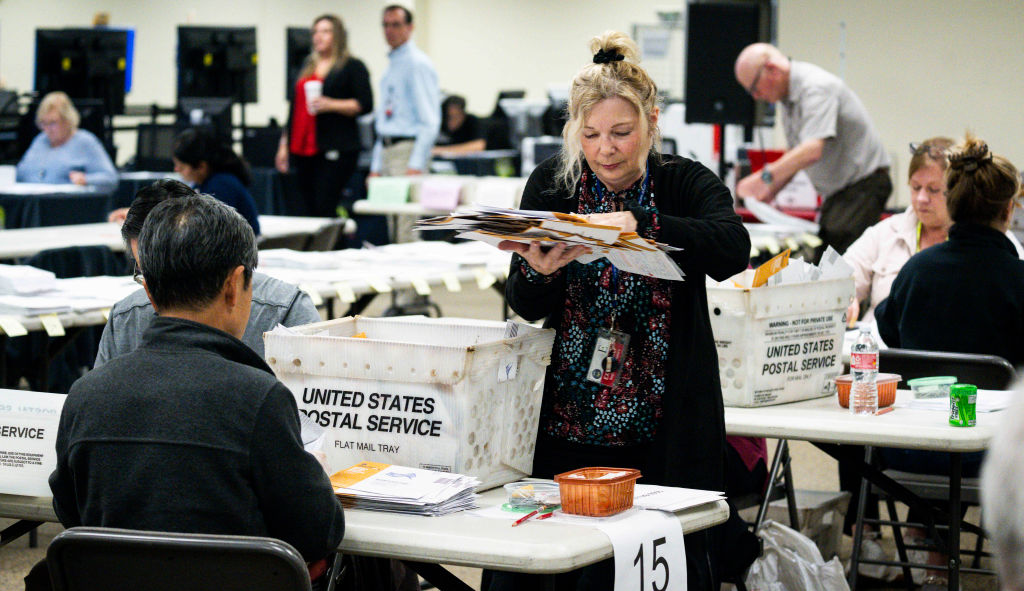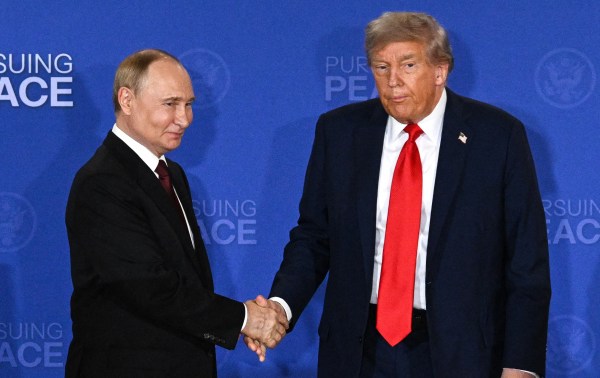Happy Wednesday! Election Day is 41 days away. What do you say we take a page from the book of Congress and just take the rest of the week off?
Up to Speed
- Things are tight as a tick in the presidential election, according to a new CNN poll released Tuesday. Among likely voters nationwide, Vice President Kamala Harris has 48 percent support with former President Donald Trump at 47 percent in a head-to-head matchup. That’s something of a shift from CNN’s previous poll, taken in July shortly after President Joe Biden withdrew from the race, which found among registered voters 49 percent said they would vote for Trump and 46 percent for Harris. The Real Clear Politics average of national polls gives Harris just a 2-point lead over Trump.
- Republicans’ fight to give Nebraska winner-take-all apportionment of its electoral votes seems to have failed as Gov. Jim Pillen announced Tuesday that he would not call a special session of the unicameral Legislature to make the change. Pillen had said he would call a special session to pass winner-take-all only if 33 senators publicly committed to voting for it. After Mike McDonnell, a state senator from Omaha, said Tuesday he would not vote for the change, Republicans would have needed to convince a Democrat—or the Legislature’s one nonpartisan progressive—to flip.
- Harris said Tuesday that she was in favor of the Senate doing away with the filibuster to codify Roe v. Wade. “I think we should eliminate the filibuster for Roe,” she told a Wisconsin radio station in an interview that aired Tuesday. Democratic senators and Senate candidates voiced support months ago for eliminating the filibuster. However, Sen. Jon Tester of Montana, perhaps the most vulnerable Democratic senator this election cycle, said he was in favor of changing the filibuster to make it so that senators would need to continuously speak to hold up a bill. “My stance is this: We need to change the filibuster into a talking filibuster,” he told Semafor last week. “We should not eliminate the filibuster.”
- Outgoing Sen. Joe Manchin of West Virginia, a former Democrat who became an independent earlier this year, said Harris’ position stopped him from endorsing her. “Shame on her,” Manchin told CNN. “She knows the filibuster is the Holy Grail of democracy. It’s the only thing that keeps us talking and working together. If she gets rid of that, then this would be the House on steroids.” The same day, fellow Democrat-turned-independent Kyrsten Sinema, who is also retiring from the Senate at the end of this year, also slammed Harris. “To state the supremely obvious, eliminating the filibuster to codify Roe v Wade also enables a future Congress to ban all abortion nationwide,” she wrote on X. “What an absolutely terrible, shortsighted idea.”
The federal government controls nearly 70 percent of Utah’s land.

Get Ready for Another Long Vote-Counting Process

On the morning of November 4, 2020, then-President Donald Trump tweeted in outrage as the election results continued to pour in from the day before.
“Last night I was leading, often solidly, in many key States, in almost all instances Democrat run & controlled,” he posted. “Then, one by one, they started to magically disappear as surprise ballot dumps were counted. VERY STRANGE, and the ‘pollsters’ got it completely & historically wrong!”
The frustrated Republican president had seen something familiar to those who have watched election results reported on television in real time: large “dumps” of votes from populous precincts or from mail-in and absentee ballots that can often dramatically narrow the margins or even shift the lead from one candidate to another.
It happened to both Trump and Joe Biden in 2020. In Pennsylvania, for instance, Trump led Biden in the initial vote count, but his lead shrank as more votes, including large numbers of mail-in votes, from heavily Democratic Philadelphia and Pittsburgh were reported in large tranches. A similar but reverse scenario happened in North Carolina, where Biden’s early lead evaporated as more Republican precincts came in and Trump narrowly took over.
The fact is that there’s nothing “magic” about margins shifting as ballots come in and are counted, but Trump’s focus on so-called ballot dumps means he will almost certainly focus on any election night shifts in the votes away from him in the multiple swing states. Most states, including the majority of the big seven battlegrounds, will either be counting absentee and mail-in ballots on a rolling basis in the days or weeks before the election, or at least processing them (that is, opening envelopes, verifying names and registration status, and/or sorting them for delivery to a polling place) to be counted quickly on Election Day.
But two states will not start counting ballots received in the mail until polls have closed on November 5: Pennsylvania and Wisconsin. That could mean a repeat of the 2020 election, when major media outlets did not declare a winner of the presidential election until it was clear Biden had won Pennsylvania, four days after polls had closed.
Here’s a quick overview of how each of the seven battleground states—Arizona, Georgia, Michigan, Nevada, North Carolina, Pennsylvania, and Wisconsin—will be processing and counting mail-in ballots:
Arizona
Any registered voter in Arizona can request a mail-in ballot, according to state law. Completed ballots, meanwhile, are counted as soon as they are received by the county elections officials. Ballots can be returned either by mail or in official drop-boxes, and verification that a voter’s signature on the ballot matches the signature on that voter’s registration file is required before it is counted.
Georgia
Any registered voter in Georgia can apply for an absentee ballot, with applications only accepted between 78 and 11 days before Election Day. Completed absentee ballots sent back can be processed as early as the third Monday before Election Day (October 21 this year), but those ballots cannot be counted until Election Day. According to state law, county election superintendents can authorize the counting of absentee and military/overseas ballots after 7 a.m. on Election Day, and counting must be completed by 8 p.m. or within one hour of the closing of every poll in that particular county.
All of this might mean Georgia can expect swift results, but the Republican-controlled state’s elections board voted last week to approve a rule requiring each voting precinct conduct a second counting of ballots by hand on Election Day and to resolve discrepancies with the machine count. Republican officials, including Secretary of State Brad Raffensperger and Attorney General Chris Carr, said before and after the board’s vote that they oppose the new rule, which could face legal challenges. But if the board has its way, it could take much longer than usual to get results, in-person or absentee, from Georgia.
Michigan
Any registered voter in Michigan is entitled to an absentee ballot, according to state law. Absent voters mail their completed ballots back to the clerk for their local voting jurisdiction (such as a county, city, or township).
A useful worksheet from the secretary of state’s office explains that these local jurisdictions can determine for themselves whether to count absentee votes on Election Day at the specific polling place or to establish one or more “absent voter counting boards” (AVCB) that process and count absentee ballots. Larger jurisdictions (a population of more than 5,000) that use these AVCBs can begin counting absentee ballots as early as eight days before Election Day. Absentee ballots can be delivered to polling stations for counting on Election Day through 8 p.m. There are no limits to how early on Election Day these absentee ballots can be counted, but no jurisdictions can generate results, either from counted absentee ballots or in-person ballots, before 8 p.m.
Nevada
Since the 2022 midterm elections, Nevada has sent a mail-in ballot to every registered voter who has not opted out, making it the only 2024 battleground state to have essentially universal vote-by-mail. These ballots can be mailed in or dropped off at an official ballot box in the county in which the voter is registered. Ballots postmarked on or before Election Day can be accepted as long as they are received no later than four days after Election Day. (The Trump campaign sued to overturn this aspect of the law, but the case was thrown out earlier this year.)
According to the Nevada secretary of state’s website, mail-in ballots can be processed for counting beginning as early as 15 days before Election Day. Counties can begin posting their election results online as soon as the secretary of state confirms all polling locations have been closed and the last voter has voted.
North Carolina
Any registered voter in North Carolina can request a mail-in (also known as an absentee) ballot, according to state law. The law requires that absentee and military/overseas ballots be counted by officials at each county’s board of elections on Election Day. Military and overseas ballots can be counted as early as 9 a.m. on Election Day and beginning no later than 5 p.m., while absentee ballots can be counted as early as 2 p.m. on Election Day and beginning no later than 5 p.m. But county election boards are authorized to process absentee ballots before Election Day, provided the actual counting of those ballots does not occur until Election Day.
Pennsylvania
Any registered voter in Pennsylvania can request a mail-in ballot, and those who are physically unable to be at their polling place on Election Day can request an absentee ballot. The processes for completing and submitting mail-in ballots and absentee ballots are largely the same, and the Pennsylvania Department of State refers to both as “mail ballots.”
But existing state law limits when these mail ballots can be processed prior to counting. Under the current law, pre-canvassing—opening mail ballots and processing them through the voting machine—can begin only at 7 a.m. on Election Day, with canvassing, or tabulating the votes from mail ballots, only allowed to begin at 8 p.m. on the same day. This law accounted for the significant delay in results from Pennsylvania in 2020, particularly because of the large number of mail ballots submitted due to the COVID pandemic.
A push to change the state law and allow counties to begin pre-canvassing mail ballots a week before Election Day passed the state’s House of Representatives earlier this year, but it languished in the state Senate thanks to Republican opposition. So the delayed process for counting votes in Pennsylvania that led to Trump’s outrage four years ago could very well repeat itself.
Wisconsin
Any registered voter in Wisconsin can request an absentee ballot, according to state law. But very similarly to Pennsylvania law, election officials cannot begin processing and counting these absentee ballots until Election Day. Also similar to Pennsylvania, Wisconsin legislators Wisconsin have tried to amend the election law to begin the process on absentee ballots, with a bipartisan majority of the state House of Representatives passing a bill to do so last year. But the bill has seemingly died in committee in the state Senate.
Eyes on the Trail
- Former President Donald Trump will deliver remarks in Mint Hill, North Carolina, a suburb of Charlotte, this afternoon.
- Vice President Kamala Harris will deliver remarks in Pittsburgh this afternoon in what is expected to be an address on the economy. Harris will also sit down for an interview on MSNBC this evening with Stephanie Ruhle.
- Sen. J.D. Vance will deliver remarks in Traverse City, Michigan, this evening.
- Doug Emhoff will headline Harris campaign events in Wilmington, North Carolina, and Charlottesville, Virginia. Also in Charlottesville, the second gentleman will deliver remarks at a Harris campaign “reception,” likely a fundraiser.
- The Trump campaign was scheduled today to proceed with Day 3 of a three-day bus tour across Wisconsin, with stops in Reedsburg, Watertown, and Waukesha. Headliners for the events include former Pentagon official Kash Patel, Wisconsin GOP Chairman Brian Schimming, former Wisconsin Gov. Tommy Thompson, former acting Homeland Security Secretary Chad Wolf, former Rep. Lee Zeldin of New York, and various local and state conservative activists.
Notable and Quotable
“Having gone to Springfield, I didn’t see that evidence.”
—Former Republican presidential candidate Vivek Ramaswamy speaking about claims of Haitian migrants eating pets with CNN’s Kasie Hunt, September 24, 2024









Please note that we at The Dispatch hold ourselves, our work, and our commenters to a higher standard than other places on the internet. We welcome comments that foster genuine debate or discussion—including comments critical of us or our work—but responses that include ad hominem attacks on fellow Dispatch members or are intended to stoke fear and anger may be moderated.
With your membership, you only have the ability to comment on The Morning Dispatch articles. Consider upgrading to join the conversation everywhere.